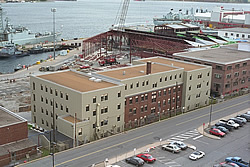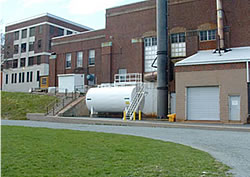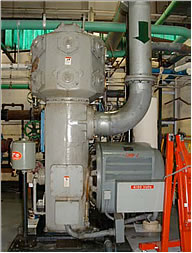ARCHIVED - Canadian Forces Base (CFB) Halifax – Building on Success
Information Archived on the Web
Information identified as archived on the Web is for reference, research or recordkeeping purposes. It has not been altered or updated after the date of archiving. Web pages that are archived on the Web are not subject to the Government of Canada Web Standards. As per the Communications Policy of the Government of Canada, you can request alternate formats. Please "contact us" to request a format other than those available.

Canadian Forces Base (CFB) Halifax is Canada's East Coast naval base and home port to the Atlantic Fleet. The Base is comprised of a variety of military properties focused around the strategic Halifax Dockyards in Nova Scotia and has the most infrastructure of any military base in Canada. The Base employs over 14,460 personnel, consists of over 700 buildings, with a total floor space of over 5.2 million square metres (m2), and includes six central heating plants with an output of 562,725 pounds of steam per hour. The base provides construction engineering, safety, environmental management, logistics, harbour support and emergency response services to Maritime Forces Atlantic and assigned lodger units.
CFB Halifax has signed a second energy performance contract (EPC) with Honeywell, a pre-qualified energy services company (ESCO) on the Qualified Bidders List (QBL) of the Federal Buildings Initiative (FBI). The base is investing $9.5 million over 10 years, and will save approximately $1.4 million or 10 percent in annual energy costs. It will also lower energy consumption by 100,000 gigajoules (GJ), cut water consumption by 54,075 m3 and reduce greenhouse gas (GHG) emissions by 12.9 kilotonnes per year.

The EPC will focus on approximately 130 buildings. The types of buildings include offices, maintenance and repair workshops, warehouses, physical plants, a recreation and fitness centre, rinks, retail stores, day care centres, an airport control tower and aircraft hangars.
Work at CFB Halifax began in February 2008. Honeywell is currently implementing the following energy efficiency measures:
- Installation of High-Efficiency Lighting in high bay areas of workshops, warehouses and hangars.
- Upgrades to the central heating plants will reduce fuel used for heating. The plants use mostly no. 6 fuel oil. Each gallon of fuel oil reduced saves about 10 kg of carbon dioxide (CO2).
- Improvements to the central heating plant boiler automation system.
- Enhancements to the heating, ventilating and air conditioning (HVAC) control system, including automatic start/stop schedules.
- Upgrades to the HVAC mechanical system, including conversion of the constant volume air handling systems to variable air volume (VAV) and installation of variable frequency drives to control fan speeds.
-
Improvements to the central steam distribution system, including replacement of steam traps, installation of steam pressure control and repairs to steam piping and insulation.

- On-site training for building personnel to ensure staff operate and maintain new equipment and systems efficiently. This will also help engage their involvement during the construction stage and make hands-on training much more effective once Honeywell has implemented the measures. Staff will receive preliminary training of the following key technologies: central boiler automation, HVAC control and mechanical systems.
- An employee awareness program will help educate building occupants about energy efficiency and motivate them to cut their energy use at the Base. Regular updates about the retrofit project will also be available on the “Energy Matters” Web site, in the base newspaper and at Energy Awareness booths erected at various key buildings throughout the Base.
In 1995, CFB Halifax signed its first EPC with GE Energy Management and Honeywell Limited.
The project included a retrofit of 260 buildings. The measures included a lighting refit, upgrades to the heating, ventilation and air conditioning (HVAC) control system, improvements to the night temperature and ventilation set-back and connection of 138 buildings to a remote energy monitoring and control system (EMCS).
Construction at the base was completed in 1997. In March 2003, CFB Halifax opted for an early buyout of the $11.2 million EPC. The expected savings of the project were $1.5 million in annual energy costs; instead, the EPC project saved close to $2 million in annual energy costs. As well, the annual GHG emissions footprint decreased by 15.02 kilotonnes.
For more information on the energy efficiency project at CFB Halifax or to find out about other EPC projects undertaken by federal government organizations throughout Canada, contact:
Federal Buildings Initiative
Natural Resources Canada
580 Booth Street, 18th Floor
Ottawa ON K1A 0E4
Web site: oee.nrcan.gc.ca/fbi
Fax: 613-947-4121
Toll-Free number: 1-877-360-5500
Canadian Forces Base Halifax
Logan Paske, Project Manager
Tel.: 902-722-4977
Fax: 902-721-5486
Email
Web site
Honeywell Limited
Niels Keyser, Project Manager
Tel.: 902-468-8509
Fax: 902-468-2416
Email
Web site
Page details
- Date modified: